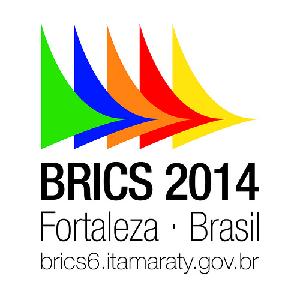After having held the II. BRICS summit in Brasília in 2010, Brazil hosted the annual meeting of the respective heads of governments once again in Fortaleza this year, shortly after the end of the World Cup. The idea to establish a mutual development bank as an alternative to the world finance organisations Bretton-Woods, the World Bank and the International Monetary Fund (IMF) – all dominated by “Western industrialised countries” – had already been decided at the V. Summit. Long before the actual establishment of the BRICS had emerging and developing countries lamented the dominance of Americans and Europeans in the most important official positions in said institutions whose customers, on the other hand, are mainly developing nations. The tradition to appoint a U.S. American as World Bank President and a European as Director of the IMF is still prevalent today. The idea of a bank exclusively for the BRICS should therefore rather be regarded as an alternative to finance internal development programmes outside of the fixed rules of the global financial system. In particular Lula harshly criticised this form of “Northern dominance”.
The foundation of the “New Development Bank” in Brazil can hence also be considered a success of the Brazilian BRICS diplomacy, as a concrete project now follows loud rhetorical demands. What does this bank look like and what are its main tasks? The bank is currently under development and will be headquartered in Shanghai, a first hint at China’s influence among the BRICS nations. Every country is granted one vote without veto power, thus maintaining the principle of equality at least on the surface. By appointing the chairman, Brazil will be in a leading position from the early days onwards. In total, all the member states will bring USD 10bn of start-up capital to the table but the banking capital can successively be increased to up to USD 100bn. It is interesting to note that, in the short-term, only the BRICS nations themselves will provide the capital for bank themselves in the short-term in order to implement their own, national development programmes. The question when other states will be able to benefit from the bank´s capital flow and reserves remains is yet to be discussed. The BRICS bank is therefore – quite advantageously for Brazil – a development bank by and for the BRICS with the pronounced perspective to become the Bank by the South, for the South.
Less likely to generate as much publicity but by no means less significant is the initiation of the Contingent Reserve Arrangement, a capital reserves fund which will start working in 2016. Modelled in its functions after the IMF, the system is to provide currency reserves through Swap arrangements to BRICS nations that are experiencing economic difficulties in order to guarantee the nations’ liquidity in the short to medium term. The principle of equality as maintained by the New Development Bank will not be valid for the fund. While Brazil, Russia and India each contribute USD 18bn of capital, South Africa only supplies 5bn and China 41bn. This distribution indicates China’s economic relevance among the BRICS: With a GDP that exceeds those of all the other member states combined, China dwarves the other BRICS nations in economic terms. Today, China is the second biggest economy in the world, while Brazil and Russia follow at rank seven and eight and India at ten, respectively. Trailing behind is South Africa as Africa’s most important economy at 33rd place – its inclusion has never been justifiable in economic terms but the group needed the legitimation to call an African nation one of its members. The Brazilian South-South rhetoric and the recurring references to the mutual history with Africa go hand in hand with this move.
How strong are the economic relations of the BRICS states actually? A first glance at the statistics is rather revealing: Only China manages to maintain intensive and active trade relations with all the four partners. At the latest since 2013 China has become the most important trading partner for Brazil, Russia, India and South Africa and a significant investor, with thousands of jobs depending on the Asian nation in each of the countries. Conversely, trade between the other states is minimal or non-existent but increasing rapidly. In order to emerge as an alliance that shapes the global economy the BRICS have to further diversify their trade channels among themselves. The projects that are to be financed with funds from the Development Bank will surely have the potential to contribute to the diversification of internal trade routes and might lower the dominance of China at least to a certain extent.
Where are the BRICS on a political spectrum? Especially in the context of current international conflicts and crises the influence of the BRICS is larger than it seems. Brazil has stayed silent with regards to Russia’s annex of the Ukraine in order to benefit from Russian embargoes against European, North American, Japanese and Australian agricultural products. As the world’s biggest exporter of beef Brazil is increasing its exports to Russia by a multiple and thus chooses a pragmatic economic approach. Since Russia’s embargo affects the other meat producing competitor countries Australia and Canada, Brazil also gains a bit of leeway in the process of setting prices. The influential Brazilian agricultural industry hence benefits in a special way from this BRICS pragmatism.
In conclusion, the BRICS are currently growing continuously closer together from an economic standpoint both with the help of and despite China’s dominance. Using new instruments they are building an alternative to the global financial system dominated by the West, which they are feasibly implementing, even though it is only for the sake of their own internal development at the moment. Politically speaking, they employ pragmatism that partially disables Western politics and shows alternative routes. Brazil´s South-South rhetoric that was started under the aegis of Lula is taking ever more concrete shapes.
The article has also been published in the journal Tópicos (03/2014) of the German-Brazilian Society.




